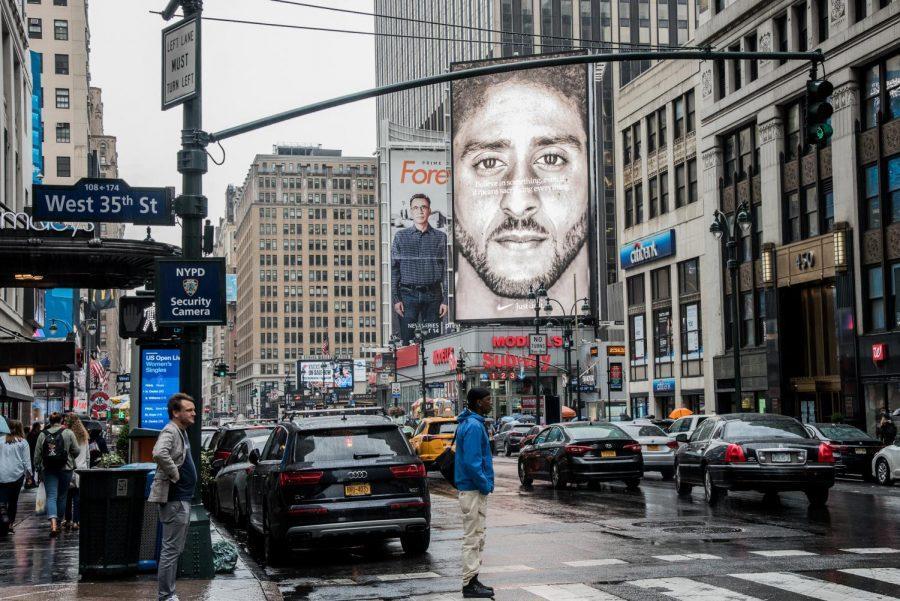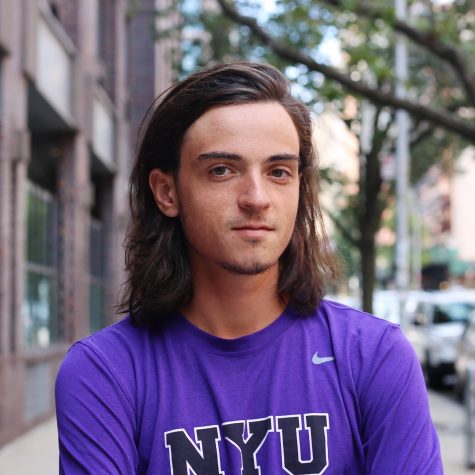Students Stand With Colin Kaepernick’s Nike Ad
Nike recently unveiled a new series of advertisements, including this billboard of Colin Kaepernick by Madison Square Garden. The text over the image of Kaepernick, the NFL quarterback who started protesting police brutality in 2016, reads “Believe in something. Even if it means sacrificing everything.”
September 10, 2018
If someone told us in 2013 that Colin Kaepernick would one day be the face of Nike, we might not have questioned it. He had just jumpstarted his career and was presumed to be the next big thing in the National Football League. But five years later, he is without a team and one of the most controversial figures in sports.
Nike confirmed on Labor Day that Kaepernick signed a multiyear deal that makes him the face of the company’s 30th anniversary “Just Do It” campaign.
During the summer of 2016, Kaepernick began kneeling during the national anthem to draw attention to police brutality targeting young black, sparking controversy throughout the league and the nation. Since then, a wave of on-field protests has taken the league by storm, pitting players, owners, league officials and fans against each other. The NFL has struggled to contain the protests, leading television ratings to dip and others — including President Donald Trump — to attack the NFL for not disciplining players who refuse to stand for the national anthem.
Though Kaepernick and other NFL players have maintained that the purpose of their protest is to raise awareness of acts of police brutality resulting in deaths of unarmed black Americans, many, mostly white, people across the country still criticize the players and NFL organizations for disrespecting the military, flag and nation.
Amid all the tension, Kaepernick opted out of his contract with the San Francisco 49ers to become a free agent in 2016 and he remains unsigned. But he stays unapologetically committed to his mission of peacefully protesting in an attempt to bring about change in the United States.
In fact, Nike’s new advertisement featuring Kaepernick confirms that his activism and movement against racism and social injustice will continue to be a topic of discourse among Americans and fans of football.
The first ad is a black-and-white photograph of Kaepernick’s face with the words, “Believe in something. Even if it means sacrificing everything” — perhaps a reference to Kaepernick’s lawsuit against the NFL for allegedly ostracizing the quarterback and colluding to keep him out of the league over his role in the protests. On Aug. 30, the league’s request to dismiss Kaepernick’s case was denied.
On Wednesday, Nike came out with a 90-second video advertisement narrated by Kaepernick, and also featuring tennis legend Serena Williams and the NBA superstar LeBron James. The ad ends with the slogan, “It’s only crazy until you do it. Just do it.”
“I loved it,” Stern senior Meredith Hackerson said. “The first time I watched it, it gave me chills, as it also did the second, and every time I’ve seen it since. It’s a powerful message and one that I think is important – you should never be complacent, you should always keep striving to better yourself.”
Stern sophomore and softball player Honor Sankey agreed and believes that Nike made the right decision in standing with Kaepernick.
“I think it’s a great business decision, and will land Nike on the right side of history,” Sankey said. “More importantly, however, it’s the right social decision, and I was happy to see Nike come out in support of Kaepernick after the NFL was so incredibly dismissive of him.”
Nike is also the official and exclusive provider of NFL apparel until their current deal expires in 2028. In response to the news that Kaepernick, who has reportedly been under contract with Nike since 2011, would be involved in Nike’s ad campaign, the NFL said in a statement that it “believes in dialogue, understanding and unity” and embraces “the role and responsibility of everyone involved with this game to promote meaningful, positive change in our communities.”
Nike’s “Dream Crazy” advertisement aired during the third quarter of the NFL’s season opener between reigning Super Bowl champions Philadelphia Eagles and the Atlanta Falcons which was nationally televised on NBC.
While many support Kaepernick’s partnership with Nike, others across the country have decided to boycott the company and even burn their Nike apparel. Countless videos of people cutting up their Nike socks and burning Nike sneakers have surfaced on social media, with the hashtags #NikeBoycott and #BurnYourNikes.
The trend has even caught the eye of President Trump, who tweeted “Just like the NFL, whose ratings have gone WAY DOWN, Nike is getting absolutely killed with anger and boycotts. I wonder if they had any idea that it would be this way?”
Kaepernick has long been a lightning rod for controversy, anger and discourse in the United States, and Nike’s public show of support has caused a rift between those who wholeheartedly agree with the company’s decision and those who refuse to support anyone or anything affiliated
with Kaepernick.
“I think those who choose to boycott Nike have every right to do so, but personally, Nike’s partnership has made me respect them more,” Tisch junior Syona Varty said.
While some, including President Trump, may have thought that Nike would suffer financially from the repercussions of their partnership with Kaepernick, the opposite has happened. A report from Edison Trend shows that following a brief decline, the shoe titan’s online sales grew 31 percent after the debut of the ad campaign, compared to 2017’s 17 percent increase during that same time period.
Colin Kaepernick is one example of an athlete that has taken a strong public stand on social and political issues, but Varty believes that other athletes can do more.
“I think athletes, and celebrities in general, have a unique responsibility thrust upon them with fame,” Varty said. “They are role models to many children and influencers in our society. That being said, I believe it is their right to use their platform to promote change if they so please. I do not believe every celebrity must — it is their choice — but I have a great deal of respect for those who choose to use their fame to try and promote positive change.”
“Dream Crazy” has been viewed more than 21 million times on YouTube and generated more than 224,000 retweets.
The conversation surrounding his protests doesn’t look to be slowing down anytime soon.
A version of this article was printed in the Monday, Sept. 10 print edition. Email Bela Kirpalani at [email protected].





























































































































































